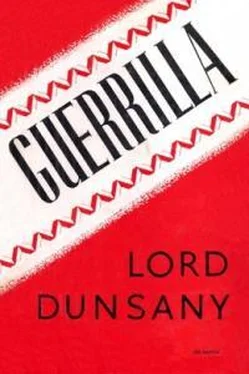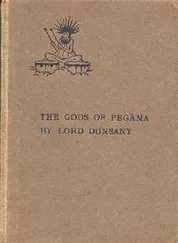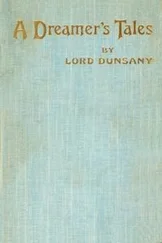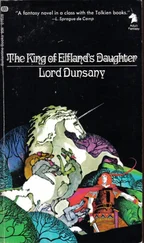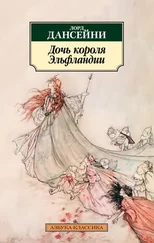Лорд Дансейни - Guerrilla
Здесь есть возможность читать онлайн «Лорд Дансейни - Guerrilla» весь текст электронной книги совершенно бесплатно (целиком полную версию без сокращений). В некоторых случаях можно слушать аудио, скачать через торрент в формате fb2 и присутствует краткое содержание. Год выпуска: 2015, Издательство: epubBooks Classics, Жанр: Прочие приключения, на английском языке. Описание произведения, (предисловие) а так же отзывы посетителей доступны на портале библиотеки ЛибКат.
- Название:Guerrilla
- Автор:
- Издательство:epubBooks Classics
- Жанр:
- Год:2015
- ISBN:нет данных
- Рейтинг книги:5 / 5. Голосов: 1
-
Избранное:Добавить в избранное
- Отзывы:
-
Ваша оценка:
- 100
- 1
- 2
- 3
- 4
- 5
Guerrilla: краткое содержание, описание и аннотация
Предлагаем к чтению аннотацию, описание, краткое содержание или предисловие (зависит от того, что написал сам автор книги «Guerrilla»). Если вы не нашли необходимую информацию о книге — напишите в комментариях, мы постараемся отыскать её.
Guerrilla — читать онлайн бесплатно полную книгу (весь текст) целиком
Ниже представлен текст книги, разбитый по страницам. Система сохранения места последней прочитанной страницы, позволяет с удобством читать онлайн бесплатно книгу «Guerrilla», без необходимости каждый раз заново искать на чём Вы остановились. Поставьте закладку, и сможете в любой момент перейти на страницу, на которой закончили чтение.
Интервал:
Закладка:
"And the rifle," said Srebnitz to remind Gregor of a point from which they had wandered away.
"You must do as you think best," said Gregor. "Indeed you must do that at all times. What I did myself was to carry it through the streets while they were quiet; but I had a small saw with me so that I could saw off the stock in any place where I hid, and carry the barrel under my waistcoat and down my trouser–leg. As it turned out I did not use the saw. If you do carry it that way it's best to have a stick, and walk a bit lame. Here is the saw."
And he gave Srebnitz a small sharp saw, only a few inches long. "Don't bring the stock," he said, "if you cut it off. You can carve another stock out of a cork–tree. And now get your air–gun, and let's see how you can shoot."
While Srebnitz went to get his air–gun Gregor picked up a large empty match–box and, opening it to make it a little larger, and walking out of the house and across the street, set it up on the pavement against the opposite house. Rifle practice, even of so humble a sort, in the streets of a conquered city, and among two of the conquered, surprised Srebnitz as soon as he saw what Gregor had planned. But Gregor said: "This is how we must live from now on; doing whatever we like, but choosing our time for it. I will watch from this window. The moment you hear me shut it, put your air–gun away."
So Gregor leaned his head out of the window, looking up and down the street, while Srebnitz fired four shots at the match–box from six yards inside the house, and every shot hit it. Then Gregor went and picked the match–box up, and nothing had disturbed them. As Gregor walked across the street with the incriminating match–box in his hand, the idea came to Srebnitz that more might be done than he had hoped, for the trifle caught his eye, whereas he had not seen Gregor's journey all the way to the town from the Mountain.
"What part of the Mountain shall I come to?" asked Srebnitz.
"Any part," said Gregor. "We shall find you. You will be watched all the way. If you carry the rifle in your hand, carry it with the stock foremost."
Then he picked up the air–gun and looked at it.
"That's a nice air–gun," he said. "You could learn to hit a coin at seventy metres with that. Would you like it up on the Mountain?"
"Oh yes," said Srebnitz. "Shall I bring it?"
"No. You will have your rifle to bring," said Gregor. "I'll take it for you. It will go nicely."
And there and then he began to slip it down his waistcoat with the stock uppermost. And Srebnitz gave him several hundred lead slugs in a round tin. These Gregor poured loose into his pockets, and handed back the tin. Then he walked out into the street.
"See you soon," he shouted, and was gone.
Srebnitz went back to his seat by the fire, and back to his thoughts. He had no need of the fire's warmth, for spring was far on its way over all those lands, though the swallows had not yet got as far as England, and the fire was only there for cooking: he sat by the fire so as to see the past in it, which his fancy could sometimes discern in its luminous scenery. He would have liked to have left some flowers upon his parents' graves; but, thinking it all out, he decided that he must choose between that and vengeance.
Then, having made his choice, he went out for a walk through the streets of the little capital to see where the sentries were: and he went in the direction of the Mountain. Having found what he wanted, he returned to the house, stopping on the way at a street corner at which they always sold flowers, and where men were selling them even yet, and buying a bunch at the cost of a whole pound of tea, because he realised that money would not be of much more use to him for a long time to come. These he brought back to the house and he began to prepare supper. The major had not yet returned.
He had not been at work in the kitchen long when a furious knocking was heard at the door and the major was there, having come back for his supper.
" Heil Hitler ," said Srebnitz.
" Heil Hitler ," replied the major with the same solemn face. Would he never get tired of saying this? thought Srebnitz.
Srebnitz had all his wits about him now, realising that now, if ever, he must keep them about him. For he meant to go that night a bit before the moon went behind the Mountain. He could not bring himself to say much to the major, but he smiled more frequently than he had at dinner. He is beginning to get over the loss of his parents, thought the Prussian.
After supper, when he went into the kitchen to put the plates away, he packed into his pockets and about his clothes all the tea and sugar there was in the house, and a good deal of butter and some slices of bacon, and put nearly sixteen pounds of bread into a sack. Would the major go to bed before the moon set? He could not sit and watch him without letting some trace of his anxiety show through, so he stayed most of the time in the kitchen, where the major heard him moving saucepans and washing plates. Already through a window he saw the moon hanging low. Would beer help? He opened two bottles and placed them beside the major, who was pleased. Then he returned to the kitchen. There he found a sheet of paper and made out his permit; he wrote on it "It is a free Land." For a moment he wondered how to sign it, then signed with his own name.
After what seemed a long time, but may have been only ten minutes, he heard a yawn, then silence, and more silence. His father's old clock sounded loud in it. Suddenly a hope came to him, and he looked quietly into the sitting–room: it was as he hoped and the major had fallen asleep. He scattered some flowers then in rooms and nooks and corners that were especially frequented by memories of his parents, and slipped out into the street, and locked the door on the far side and threw the key away.
The moon was still in the sky, but getting near to the Mountain. The street was quite deserted, and he went quietly in the direction of a little public garden with two gates on the street, over both of which the Germans had put a sentry; and the further of the two sentries was the one that Srebnitz had chosen, because he was the nearer to the Mountain. This meant that he would have to make a detour, up a street to the right and back down another, in order to come to the further sentry without being seen by the nearer. The bit of garden was only a hundred yards long, and the distance between the two sentry–posts was no more than that; but they walked up and down and met in the middle, and would be two hundred yards apart at the end of their beats.
He walked softly, though with his boots on, and felt strangely free. He felt, although the feeling was not crystallised into thought, that Man was opposed to the night, that all his doors and locks and laws were against it. Out–of–doors now, in the silent street, no locks or laws held him. The night was no longer against him; it was his friend: and he was on the side of the night. In the houses freedom was lost now: all who abided by laws in that land abided by German laws: only in the night and on the Mountain were his people still free.
He heard the sound of three men marching, and they seemed more in the night. Then he saw the glint of an electric torch flashing out now and then. To go back would be to lose time, and the moon was getting low. There was a side–street only fifty yards ahead, which he thought he could reach if he hurried, before the men came within hearing of his light feet.
He ran softly and reached it, and ran up the steps of a house on the far side of the side–street and flattened himself against the door; not the first house, but the second, so as to have sufficient start if the patrol turned up that street. They were coming down the far side of the street he had left. If the steps left the pavement to cross the street, he would have ample time to get away from them. But they drew level and kept straight on.
Читать дальшеИнтервал:
Закладка:
Похожие книги на «Guerrilla»
Представляем Вашему вниманию похожие книги на «Guerrilla» списком для выбора. Мы отобрали схожую по названию и смыслу литературу в надежде предоставить читателям больше вариантов отыскать новые, интересные, ещё непрочитанные произведения.
Обсуждение, отзывы о книге «Guerrilla» и просто собственные мнения читателей. Оставьте ваши комментарии, напишите, что Вы думаете о произведении, его смысле или главных героях. Укажите что конкретно понравилось, а что нет, и почему Вы так считаете.
